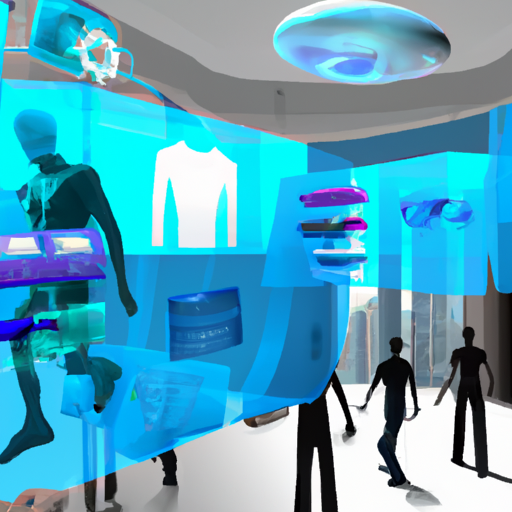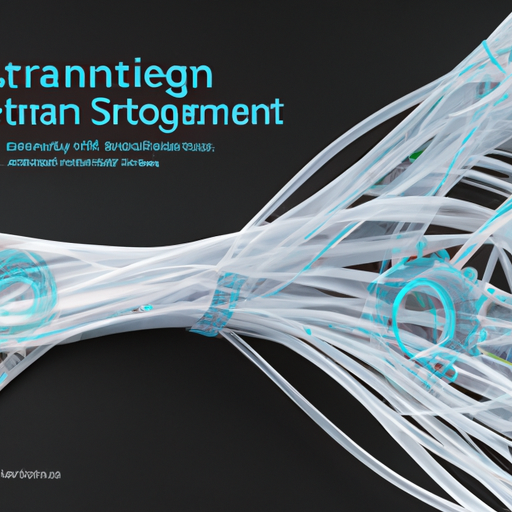Can IT Services Provide Solutions For Experiential Retail Tech?
In the rapidly evolving world of retail, it is becoming increasingly important for businesses to embrace experiential retail tech to stay ahead of the competition. But, as a business owner, you may find yourself wondering if IT services can truly provide the solutions needed to implement and optimize these innovative technologies. This article will explore the potential benefits of utilizing IT services for experiential retail tech, and how they can help enhance the customer experience, streamline operations, and drive business growth. So, if you’re ready to transform your retail business into an immersive and engaging destination, read on to discover the possibilities that IT services can offer.
Understanding Experiential Retail Tech
Experiential retail tech refers to the implementation and integration of technological solutions in retail environments to create immersive and engaging customer experiences. This approach seeks to go beyond traditional retail practices by incorporating interactive technologies, personalized experiences, and omnichannel integration. By leveraging the power of IT services, retailers can enhance their customer experience, optimize operations, ensure security, boost sales and marketing efforts, ensure seamless integration, provide training and support to retail staff, and make informed decisions based on cost considerations and return on investment.
Benefits of Experiential Retail Tech
Implementing experiential retail tech offers a multitude of benefits for both retailers and customers. By creating immersive and engaging experiences, retailers can attract and retain customers, differentiate themselves from competitors, and build brand loyalty. The use of interactive technologies allows customers to try products virtually, leading to increased confidence in purchase decisions and higher conversion rates. The integration of personalized and customized experiences ensures that customers feel valued and understood, leading to increased customer satisfaction and loyalty. Additionally, the omnichannel integration of IT services enables seamless and consistent experiences across various touchpoints, providing customers with convenience and flexibility in their shopping journey.
Challenges and Limitations
While experiential retail tech offers numerous benefits, it also comes with its own set of challenges and limitations. One of the main challenges is the cost associated with implementing and maintaining the required IT infrastructure. From investing in hardware and software solutions to ensuring the availability of technical expertise, the financial implications can be significant. Additionally, the complexity of integrating various IT services can pose operational challenges for retailers. Ensuring a seamless integration across different systems and platforms requires careful planning and execution. Moreover, ensuring data privacy and protection, as well as cybersecurity, is crucial to maintain customer trust and protect sensitive information.
Role of IT Services in Experiential Retail Tech
IT services play a pivotal role in enabling the successful implementation and integration of experiential retail tech solutions. Retailers rely on IT services to manage and support their technology infrastructure, ensuring its availability, reliability, and security. These services encompass a range of activities, including infrastructure management, software development, technical support, and data analytics, among others. Through the efficient delivery of these services, IT professionals enable retailers to leverage technological advancements and create immersive experiences for their customers.
Overview of IT Services in Retail
In the retail industry, IT services encompass a wide range of activities aimed at supporting the technology infrastructure and systems. These services include network management, hardware and software maintenance, data center management, and technical support. IT professionals are responsible for ensuring that all retail systems are functioning optimally, minimizing downtime, and resolving any technical issues that may arise. They also play a crucial role in the integration of various technologies and platforms, facilitating effective communication and data exchange across systems.
Integration of IT Services in Experiential Retail Tech
In the context of experiential retail tech, IT services are crucial for the successful integration of various technology solutions. IT professionals work closely with retail teams to understand their specific requirements and objectives, and develop strategies to leverage technology to meet those goals. They assess the existing infrastructure, identify areas for improvement, and implement solutions that enhance the customer experience. This integration often involves connecting different systems, such as point-of-sale systems, customer relationship management systems, and inventory management systems, to ensure seamless data flow and real-time visibility.
Key IT Services for Experiential Retail Tech
Several key IT services are essential for the implementation and maintenance of experiential retail tech. These services include:
- Data analytics and business intelligence: By analyzing customer data and generating insights, IT services enable retailers to make data-driven decisions and personalize the customer experience.
- Inventory management systems: IT services facilitate the implementation of inventory management systems, ensuring accurate tracking of stock levels and enabling efficient replenishment processes.
- Supply chain optimization: IT services help retailers optimize their supply chain by integrating systems, automating processes, and ensuring real-time visibility of inventory and shipments.
- Cybersecurity measures: IT services implement robust cybersecurity measures to protect sensitive customer data and prevent unauthorized access to retail systems.
- Data privacy and protection: IT services ensure compliance with data privacy regulations and implement measures to safeguard customer information, ensuring customer trust and confidence.
Enhancing Customer Experience
Experiential retail tech aims to create memorable and personalized experiences for customers. IT services play a vital role in achieving this goal by enabling personalization and customization, omnichannel integration, and the use of interactive technologies.
Personalization and Customization
Through data analytics and customer segmentation, IT services enable retailers to personalize the shopping experience for each customer. By analyzing customer data, including purchase history, preferences, and browsing behavior, retailers can recommend relevant products, offer personalized promotions, and create tailored marketing campaigns. This personalization enhances customer satisfaction and increases the likelihood of repeat purchases.
Omnichannel Integration
IT services facilitate the integration of various retail channels, allowing customers to seamlessly transition between online and offline touchpoints. By ensuring a consistent experience across different channels, retailers can create a seamless shopping journey for customers. For example, a customer may start browsing products online and then visit a physical store to make a purchase. IT services ensure that the customer’s preferences and shopping history are accessible across channels, enabling personalized recommendations and a smooth shopping experience.
Interactive Technologies
IT services enable the implementation of interactive technologies, such as augmented reality (AR) and virtual reality (VR), to enhance the customer experience. Customers can virtually try on clothes, visualize furniture in their homes, or experience immersive digital displays. These interactive technologies provide customers with a unique and engaging experience, increasing their involvement and emotional connection with the products.
Optimizing Operations and Efficiency
In addition to enhancing the customer experience, IT services play a critical role in optimizing retail operations and improving efficiency. Through data analytics, inventory management systems, and supply chain optimization, retailers can streamline their processes, improve accuracy, and reduce costs.
Data Analytics and Business Intelligence
IT services provide retailers with valuable insights through data analytics and business intelligence. By analyzing customer data, purchase patterns, and market trends, retailers can make informed decisions regarding product assortment, pricing strategies, and marketing campaigns. IT services enable the collection, processing, and analysis of data, empowering retailers to optimize their operations based on actionable insights.
Inventory Management Systems
IT services help retailers implement and manage inventory management systems that optimize stock levels, improve accuracy, and streamline replenishment processes. These systems enable real-time visibility of inventory, automated reordering, and demand forecasting. By ensuring that products are available when and where customers need them, retailers can minimize stockouts, reduce inventory carrying costs, and improve customer satisfaction.
Supply Chain Optimization
IT services contribute to the optimization of the supply chain by integrating various systems, automating processes, and providing real-time visibility of inventory and shipments. Through the integration of transportation management systems, warehouse management systems, and order management systems, IT services enable retailers to efficiently manage the movement of goods from suppliers to customers. This optimization leads to faster delivery times, reduced costs, and improved overall supply chain performance.
Securing Experiential Retail Tech
As experiential retail tech relies heavily on the collection and processing of customer data, ensuring security and data privacy is of utmost importance. IT services play a crucial role in implementing cybersecurity measures and protecting customer information.
Cybersecurity Measures
IT services implement robust cybersecurity measures to protect retail systems and customer data from unauthorized access, data breaches, and cyber-attacks. This includes implementing firewalls, encryption protocols, and intrusion detection systems to safeguard sensitive information. IT professionals continuously monitor and assess the security infrastructure, ensuring that it remains up-to-date and protected against evolving threats.
Data Privacy and Protection
In the era of increasing data privacy regulations, IT services help retailers ensure compliance and protect customer information. IT professionals work closely with legal and compliance teams to implement measures that protect customer privacy, such as obtaining consent for data collection and storage, implementing data anonymization techniques, and providing customers with control over their data. By prioritizing data privacy and protection, retailers can build trust with their customers and maintain the integrity of their brand reputation.
Improving Sales and Marketing
IT services provide retailers with the tools and platforms necessary to optimize their sales and marketing efforts. From e-commerce platforms to digital marketing strategies and customer relationship management (CRM) systems, IT services play a crucial role in driving sales and enhancing the customer experience.
E-commerce Platforms
IT services enable retailers to establish and manage e-commerce platforms, allowing customers to browse and purchase products online. These platforms provide a convenient and accessible way for customers to shop, expanding the retailer’s reach and potential customer base. IT professionals ensure that e-commerce platforms are secure, user-friendly, and integrated with other systems to enable seamless operations.
Digital Marketing Strategies
IT services help retailers develop and execute digital marketing strategies to attract and engage customers. This includes activities such as search engine optimization (SEO), social media marketing, email marketing, and content creation. IT professionals leverage data analytics to identify target audiences, create personalized marketing campaigns, and measure the effectiveness of marketing efforts. By harnessing the power of digital marketing, retailers can reach their target customers more effectively and generate higher conversion rates.
Customer Relationship Management (CRM) Systems
IT services support the implementation and management of CRM systems, which enable retailers to track customer interactions, manage customer data, and provide personalized customer experiences. CRM systems consolidate customer information from various touchpoints, allowing retailers to gain a holistic view of each customer. This enables retailers to personalize marketing communications, offer tailored promotions, and provide exceptional customer service. IT services ensure the seamless integration of CRM systems with other retail systems, optimizing the management of customer relationships.
Ensuring Seamless Integration
Seamless integration is crucial for the successful implementation of experiential retail tech. IT services play a significant role in ensuring that different systems, platforms, and technologies work together harmoniously to deliver a cohesive customer experience.
API and System Integration
IT services facilitate the integration of different systems and platforms through the use of application programming interfaces (APIs) and system integration. APIs enable the exchange of data and functionality between systems, ensuring seamless communication and data flow. IT professionals design, develop, and maintain APIs to enable the integration of various systems, such as point-of-sale systems, e-commerce platforms, and loyalty programs. This integration enables real-time data synchronization and a unified view of customer information, enhancing the overall customer experience.
Legacy System Modernization
Legacy systems, which are outdated or no longer supported by their manufacturers, can pose integration challenges. IT services help retailers overcome these challenges by modernizing and integrating legacy systems. This may involve transitioning to cloud-based solutions, migrating data, and reengineering processes to align with modern technologies. By modernizing legacy systems, retailers can ensure compatibility with other IT services and technologies, improving overall system performance and facilitating seamless integration.
Training and Support for Retail Staff
IT training programs and technical support are crucial for enabling retail staff to effectively use and troubleshoot the various technology solutions implemented in experiential retail environments. IT services provide the necessary training and support to ensure that retail staff can leverage technology to deliver excellent customer service and optimize operational efficiency.
IT Training Programs
IT services design and deliver training programs for retail staff, ensuring that they have the necessary skills and knowledge to effectively use the technology solutions implemented in the retail environment. These training programs cover topics such as system operation, data entry, troubleshooting, and best practices for utilizing the technology to enhance the customer experience. By empowering retail staff with the necessary IT skills, retailers can improve the adoption and utilization of technology, leading to improved operational efficiency and customer satisfaction.
Technical Support and Troubleshooting
IT services provide technical support and troubleshooting to address any issues or challenges that may arise with the technology solutions. This support can be in the form of a help desk, online resources, or on-site support. IT professionals are available to assist retail staff with resolving technical issues, answering questions, and providing guidance on how to maximize the benefits of the technology. By ensuring prompt and effective technical support, IT services enable retail staff to quickly overcome any obstacles and deliver a seamless and enhanced customer experience.
Cost Considerations and ROI
While implementing experiential retail tech involves investments in IT services and infrastructure, carefully considering the costs and measuring return on investment (ROI) are essential to ensure a positive financial outcome.
Determining IT Service Costs
Retailers need to assess their specific requirements and objectives to determine the costs associated with IT services. This includes considering factors such as hardware and software expenses, licensing fees, personnel costs, and ongoing maintenance and support. Retailers should conduct a thorough analysis of the total cost of ownership of the IT services to accurately estimate the investment required.
Measuring Return on Investment (ROI)
Measuring ROI is crucial to evaluate the effectiveness and financial viability of implementing experiential retail tech. While ROI can be challenging to quantify in the retail industry due to various factors influencing sales and customer behavior, retailers can consider indicators such as increased sales revenue, customer lifetime value, customer acquisition cost, and customer satisfaction scores. By continuously monitoring and analyzing these metrics, retailers can assess the impact of IT services on their business and make informed decisions regarding the optimization of their technology investments.
Future Trends in Experiential Retail Tech
As technology continues to evolve, several trends are shaping the future of experiential retail tech. IT services need to stay abreast of these trends to continue providing relevant solutions to retailers.
Emerging Technologies
Emerging technologies, such as blockchain, Internet of Things (IoT), and edge computing, are expected to have a significant impact on experiential retail tech. These technologies enable enhanced data security, real-time analytics, and personalized experiences. IT services will play a crucial role in exploring and implementing these technologies to create even more immersive and engaging customer experiences.
IoT and Connected Devices
The proliferation of IoT devices, such as smart shelves, beacons, and RFID tags, allows retailers to gather real-time data on customer behavior, inventory levels, and store operations. IT services will be instrumental in collecting and analyzing this data, providing valuable insights that can drive operational efficiency, improve personalized experiences, and optimize inventory management.
Artificial Intelligence (AI) and Machine Learning
AI and machine learning technologies have the potential to transform the retail industry. These technologies can analyze vast amounts of data to generate insights, automate processes, and provide personalized recommendations to customers. IT services will be essential in developing and implementing AI and machine learning solutions that optimize operations, enhance the customer experience, and drive sales and profitability.
In conclusion, IT services are instrumental in providing solutions for experiential retail tech. By leveraging IT services, retailers can enhance the customer experience, optimize operations, ensure security, improve sales and marketing efforts, ensure seamless integration, provide training and support to retail staff, and make informed decisions based on cost considerations and ROI. As technology continues to advance, IT services will continue to play a pivotal role in the evolution and success of experiential retail tech.








